Advertisement - Click to support our sponsors.


Hawaii’s World
WHOEVER emerges tonight as America's next president, the Honolulu-based think tank, Pacific Forum/CSIS, knows he will find Asia-Pacific issues forcing their way to the top of his agenda. The only attention to them in the three presidential debates was a remark by George W. Bush favoring keeping troops in Korea. Pacific issues await
the new presidentBut the real world will present the new administration with decisions on the two Koreas, a missile-defense system, China's strength, China vs. Taiwan, Russia's Asia-Pacific role under its new leader, Indonesia's instability and the re-emergence of India as an Asian player.
Sophisticated discussion of these issues as they affect U.S. security is what Pacific Forum/CSIS promotes. The CSIS stands for the Washington-based Center for Security and International Studies. Pacific Forum is its Asia-Pacific arm.
Their advocacy is to keep the U.S.-Japan security partnership as the heart of America's Asia-Pacific relationships. Both presidential candidates seem to concur.
Besides promoting meetings of policy thinkers from around the area, Pacific Forum has added weekly and quarterly offerings on email of developments in 12 or 13 key bilateral relationships. Knowledgeable scholars deal with each of these. They can be read on www.csis.org/pacfor.
Monday newsletters called PacNet are backed up by Comparative Connections, a detailed e-journal quarterly on East Asian bilateral relations. In print, the quarterly runs to well over 100 pages but is introduced by tightly written highlights on how the chosen dozen or so relationships progressed.
Pacific Forum's Executive Director Ralph Cossa starts with a regional overview. Then come the scholar/specialist updates on U.S.-Japan doings, U.S.-China, U.S.-Korea, U.S.-Russia, U.S.-ASEAN, China-ASEAN, China-Taiwan, China-Korea, Japan-China, Japan-Korea, Japan-Russia, China-Russia and India-East Asia.
The service is free. To me it seems invaluable as a factual base for keeping up with East Asian relationships of major importance to U.S. policy. A quick reading emphasizes an almost breathtaking pace of change which America's next president must address.
A second quarter report began: "The geopolitical landscape in Asia has changed dramatically and permanently as a result of two landmark events -- the coming of age of Taiwan's Democratic Progressive Party and the coming out of North Korea's supreme leader, Kim Jong-il."
Third quarter events featured developments on these fronts plus approval by the U.S. Congress of permanent normal trade relations for China, three regional summits and area visits by Russian President Vladimir Putin and U.S. Defense Secretary William Cohen.
PACIFIC Forum was established in Hawaii 25 years ago by retired Rear Adm. Joseph Vasey, still a board member. It was absorbed into CSIS in 1990. Its top executives, President James A. Kelly and Executive Director Cossa, log 450,000 miles a year traveling in the region. Both have national security experience in government.
Both Pacific Forum and CSIS have had leaders from both Republican and Democratic ranks. Brent Scowcroft, former assistant to President George Bush for national security, was preceded as chairman of Pacific Forum/CSIS by the late diplomat Philip Habib, a Democrat.
Kelly says the division over foreign policy in America is not so much between political parties as within them. Pacific Forum/CSIS aligns mostly with the political center against extreme isolationism on one hand and over-involvement on the other. It has no doubt the United States must be a world leader because of our great wealth and power.
A.A. Smyser is the contributing editor
and former editor of the the Star-Bulletin
His column runs Tuesday and Thursday.